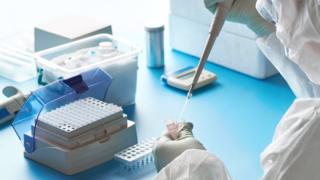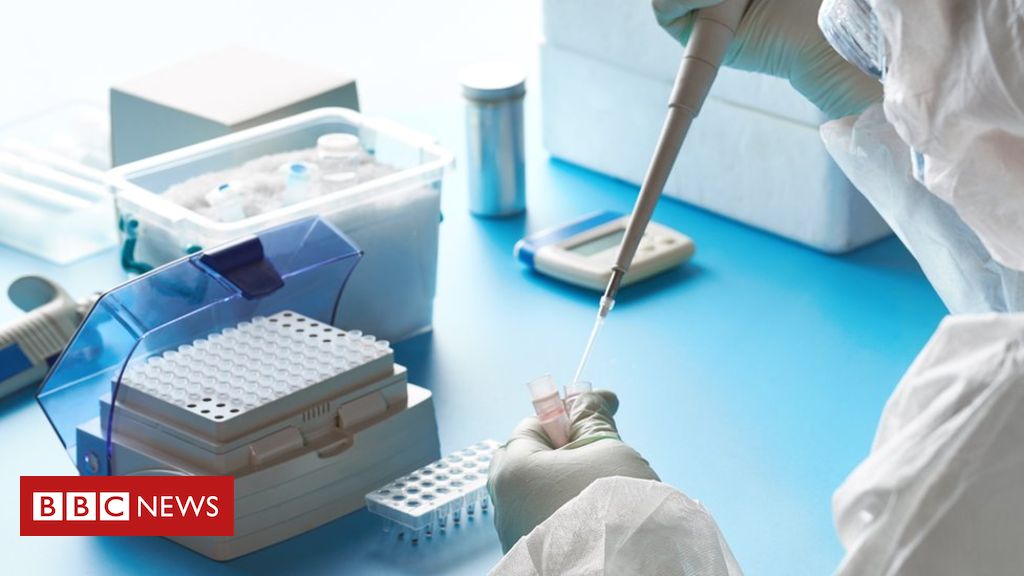 Image copyright
Image copyright
Getty Images
Hopes that coronavirus antibody tests could help the UK end its lockdown have been dealt a blow – after the World Health Organization questioned whether they offer any guarantee of immunity.
The UK has placed antibody tests – which check if someone has had Covid-19 – at the centre of an eventual “back-to-work” plan to restart normal life.
But experts said they may not prove if someone is protected from reinfection.
The UK’s testing co-ordinator has also warned people not to buy private tests.
The government has already paid for three-and-a-half million antibody tests, but has not yet found one that is reliable enough to use – and stresses that it will not approve the use of any test until it can be sure its findings can be fully depended on.
Professor John Newton said the public should not purchase unapproved antibody tests until a working test is approved.
“We are breaking new ground with this work every day and I am confident this major research effort will make a breakthrough,” he said of efforts to develop a valid serology test, which measures levels of antibodies in blood plasma.
“Until then, please don’t buy or take any unproven tests. They may not be reliable for your intended use; they may give a false reading and put you, your family or others at risk.”
He added: “As soon as we have found a test that works for this purpose, we will be in a position to roll them out across the country as a back-to-work test.”
Speaking in Geneva, the World Health Organization’s (WHO) Dr Maria van Kerkhove cast doubt on the benefit of rapid serology tests due to a lack of evidence around coronavirus immunity.
She said: “There are a lot of countries that are suggesting using rapid diagnostic serological tests to be able to capture what they think will be a measure of immunity.
“Right now, we have no evidence that the use of a serological test can show that an individual has immunity or is protected from reinfection.”
She added: “These antibody tests will be able to measure that level of seroprevalence – that level of antibodies but that does not mean that somebody with antibodies means that they are immune.”
Dr van Kerkhove said it was “a good thing” that so many tests are being developed, but she added: “We need to ensure that they are validated so that we know what they say they attempt to measure they are actually measuring.”
Still too much we do not understand
The first problem with antibody tests is there aren’t any that work at scale, but even if they did there are potential issues.
There are no guarantees that if you have antibodies against the coronavirus that you are completely immune.
And even if your antibodies do protect you from becoming sick, then you may be able to harbour the virus in your body and pass it to others.
There will be many challenges before immunity passports – when if you pass the antibody test you can go back to life as normal – will be practical.
This is the problem with a virus that has only been around for a couple of months – there is still too much we do not understand.
However, the main appeal of antibody testing is to find out how many people have really been infected with the virus.
Her colleague Dr Michael Ryan said antibody testing also raised ethical questions.
“You might have someone who believes they are seropositive [have been infected] and protected in a situation where they may be exposed and in fact they are susceptible to the disease,” he said.
Meanwhile, unions representing doctors and nurses have raised concerns about revised coronavirus guidance that allows some personal protective equipment to be reused at hospitals in England.
It comes following warnings that some hospitals could run out of the gowns used in intensive care units this weekend.
The UK announced 847 new coronavirus-related deaths in hospitals in its latest figures on Friday, taking the total to 14,576.
On Friday, Health Secretary Matt Hancock said swab tests – which assess whether someone currently has the coronavirus – will soon be rolled out to other key workers, including police officers, prison staff and firefighters.
He added some 50,000 NHS workers had been tested for the virus so far.
However, he said it was “frustrating” there was currently more capacity tests each day than the numbers that were being taken up. On Thursday, 38,000 tests were available but only 21,000 were taken, hence the government’s expansion of who will be eligible to be tested.
The government has an overall target of 100,000 tests a day by the end of April.





… [Trackback]
[…] Read More Information here on that Topic: famousreporters.com/double-warning-over-virus-antibody-tests/ […]
… [Trackback]
[…] Find More on that Topic: famousreporters.com/double-warning-over-virus-antibody-tests/ […]